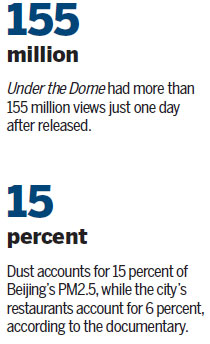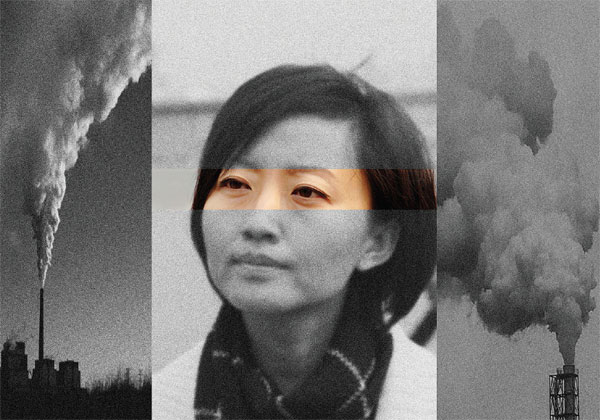Under the Dome, a self-financed movie about China's environmental meltdown, is an Internet phenomenon that has prompted millions of calls to green hotlines and seen bitter accusations leveled at the filmmaker, as Raymond Zhou reports.
It's noteworthy that the most-watched Chinese documentary did not debut in a cinema or on television. Under the Dome garnered more than 155 million hits in the first 24 hours after it premiered on half a dozen Chinese websites on Feb 28, an audience that movies and TV shows can only dream about. Numerous recommendations on social media turned Under the Dome into the talk of the nation.
Just as it sets a milestone in public communications, the film transcends platforms and genres. It's a 103-minute documentary, which is sometimes broken down into smaller segments for easy digestion; it's one continuous speech and PowerPoint-enabled presentation; and it's billed in Chinese as an investigative report. Whatever it is called, it was obviously inspired by An Inconvenient Truth, Al Gore's 2006 Oscar-winning warning on the worldwide threat of global warming.
Chai Jing's work lives up to that comparison or likely inspiration. Some prominent viewers, such as Liu Chun, former head of Phoenix TV, went one step further by saying that it's actually better than Gore's film. Chai, a celebrity television reporter and former anchor with China Central Television, is known for her Barbara Walters-style approach to journalism, which made her work more accessible to the public but was criticized by some as "too touchy-feely".
In Under the Dome, she uses her newborn daughter as the raison d'etre for launching her crusade against smog. "I had never been afraid of air pollution or worn a surgical mask," she says in the documentary. "But now as I hold a new life in my arms and feed her, I begin to truly have fear."
In a previous interview with Southern Weekly, Chai revealed that she hesitated for a long time about including her baby in the film, which was independently produced and self-financed. She probably foresaw the kind of criticism that would be hurled her way.
It's not surprising that such a massive hit has elicited diverse responses. What's truly amazing is that the plaudits came from across the ideological spectrum as well. In the movie, Chai, with the help of scientists, defines smog and its composition and how to eliminate it. Most of us already have some of that information, but the movie puts all the individual pieces into perspective.
According to Chai's investigation, fossil fuels account for 60 percent of China's airborne PM2.5 pollutants (particulate matter with a diameter of 2.5 micrometers or less). As shown in the movie, the environmental watchdog is often toothless and helpless when guarding our air. Some of the laws have been in place for years, but have never been applied. As a matter of fact, the movie explains that businesses are pressured not to abide by the laws because violating them carries little or no cost, while toeing the line invariably bumps up costs.
China's petroleum and steel industries are exposed as the biggest sources of air pollution. The petroleum sector is a State monopoly, setting lower standards of cleanliness for its products even though customers are willing and able to pay for cleaner fuel, all in the name of energy security. The steel industry suffers from a glut of capacity and receives large doses of government subsidies - this in the name of maintaining the momentum of economic growth.
Chai does not stop there. She goes on to list the things ordinary people can do to help restore clean air in the country. Half of Beijing's drivers, she says, only use their motor vehicles within a radius of 5 kilometers of their homes, while 12 percent travel within 2 km, and 7 percent within just 1 km. Chai encourages people to take public transport when covering such short distances, just as she and her family only use their car for trips to the airport, the hospital or when their child or an elderly relative is involved.
Chai also reported dust from a construction site near her home - dust accounts for 15 percent of Beijing's PM2.5 - and, within minutes, the offending material had been covered up. The city's restaurants are also a major source, accounting for 6 percent of PM2.5 in the capital, and are supposed to install purifying devices in all kitchen ventilators. A week after Chai complained, the restaurant she patronizes installed such a device.
This part, while raising public participation in the campaign for rigorous enforcement of environmental protection laws, has been criticized by some for "spreading the culpability to every citizen and diluting the focus on the government." Accusations come from both right and left, with some people accusing Chai, groundlessly, of taking money from foreign institutions, and also criticizing big businesses that represent government interests. Other critics have accused her of soft-pedaling on some crucial issues that may draw ire from the establishment.
Chai financed the movie with royalties from her previous book, which was a best-seller. There is no disclosure about her financial arrangement with websites that stream the movie. The website I accessed, Youku, displays a minute of advertising before the movie, but, unlike most of Youku's programming, there were no additional ads embedded in the movie.
Even though the movie has generally been accepted as a public service film, detractors claim Chai is a heavy smoker, which they say is irresponsible in view of her newborn child, or has secretly emigrated, which makes her an outsider in China. Both points have been refuted. Perhaps the overwhelming approval from the public has made the minority voices of dissension louder and more cantankerous than they actually are.
However, it's a little pathetic that the focus has been shifted from the issue to the person. Chai is wisely lying low. Meanwhile, an increasing number of people are heeding her advice to take upon themselves the kind of things each individual is capable of doing to change the climate for the better. Wang Run, a Beijing-based theater critic, now takes her son around town by subway. Phones at the hotline listed in the movie, 12369, are reported to have been ringing off the hooks as citizens report what they see as environmental violations. And the public will inevitably keep a sharper eye on government regulations and implementation to solve the problem from the roots.
A netizen with the handle Zhi Shousi, who works as a manager with Amazon China, uploaded a screen capture from his mother, who is uncomfortable using the Web: "I saw Chai's movie. It makes the point that everyone has a responsibility when a country faces a crisis. A mother's love is the same everywhere. Chai speaks for thousands of mothers who are unable to say or do what they want to protect their children. She could have escaped to a better place, but she chooses to challenge the smog. She is paying her price for it. I salute her, a true hero of our time."
Contact the writer at raymondzhou@chinadaily.com.cn


